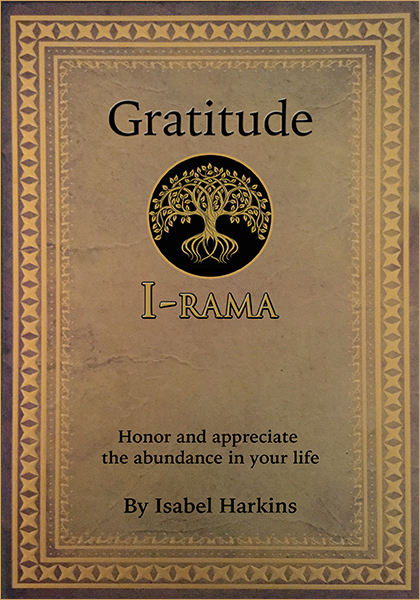
Gratitude
Let’s start by centering ourselves and taking a few slow deep breaths all the way down to our bellies, relaxing and centering ourselves with each breath more and more.
When you are ready to go to your journal and write down the things, the people, the experiences or whatever comes to mind that you are grateful for.
By making this your daily practice, (it only takes a few minutes if that), your life will transform in a way that you have never expected.
It is important here to focus on the experiences, people, and things that you already have, instead of focusing on what you don’t have, by that I mean focus in the NOW. The energy of lack only confirms lack the fact that we don’t have something or someone that we wanted for example, by focusing on this energy, we create more of it, and I am sure that is not what you want. All entries in the journal must be positive and done in the present tense, like:
“I am grateful to be granted another day to appreciate how lucky I am to be alive”
This is just and an example you will know exactly what you are thankful for at this moment, you are the source.
Let’s move to another interesting piece that not only creates gratitude but at the same time wakes up acceptance, letting go of our ego, forgiveness, among other positive actions. By being in this energy we step up in our evolution to a more centering space our true source, what a gift and here is a big step to that. Think of a challenging event that happened today or in your life, write it down and find what you learned from it, here is an example:
“As I was talking to my friend I realized through her negativity of speech that I was pretty positive on my outlook of life”
“ Today, I got lost trying to find where I was going, and in the process, I realized that it was a much shorter and quiet way to get there”
The bottom line is that Gratitude is a great foundation to integrate all our experiences. Here is your field of all possibilities, where your desires can manifest into reality and you can live in your purpose.
As you set your intentions, fill your whole self with gratitude. Intentions are a great place to start where we can fulfill our dreams and combined with gratitude they become a reality. This combination never fails, it creates clarity on the energy that you really really want, and when you apply energy, focus and attention to something it creates more of it, that is the Universal Law. So here is a good place to check in with our awareness. If we are focusing on negativity or hooking up with what the media or on what people thrive on like all the negative programming we get, that only take us farther away from our own true selves, I consistently check with myself, am I being just plain critical about something? is it my reality? or am I joining in mass programming? You will be surprised how many negative comments and thoughts we have through the day that we are not aware of. Caution here. due to the inevitable fact that these energies shape our reality.
The NOW is where we can manifest, the past is gone it doesn’t exist anymore. What we look like when we were 10 years of age is not longer here, the future doesn’t exist, only the now does so let’s shape our NOW, and the future will be a gratitude shaped life full of our desires come true. You don’t have to believe in it, it just is, have faith, patience with yourself, we all come from the field of all possibilities we just need to remember and awake this place with thankfulness Gratitude is a great key to your portal.
Be patient, trust your inner power and your divine connection, we tend to seek validation from the outside and strive for proof that only disconnect us from our instincts. Experience wonder, be surprised, let go of control and your life will be free, peaceful and full of joy, believe like a child does. Wake up the feelings that everything is possible, that is how the people that are great at manifesting do it in this world, and you can also accomplish this.
Let’s align you first with your source
Let’s be very clear, that way you don’t create static that stops the flow.
Be focused. Energy goes where we direct it to.
Be in gratitude, feel it inside and outside yourself all around
Ask for your purpose.
Let’s start our week Journal. Place a date on each day that you write on it, so down the road, you can come back to it and be grateful for where it took you, this is a great place to observe how much Gratitude journaling it works.
Scientific Research on Gratitude

“Can you see the holiness in those things you take for granted–a paved road or a washing machine? If you concentrate on finding what is good in every situation, you will discover that your life will suddenly be filled with gratitude, a feeling that nurtures the soul.” — Rabbi Harold Kushner.
A well thought out Thank You, instead of a half-hearted, “Thanks,” often leaves people feeling pretty good. Perhaps there was a moment that you can reflect on, that involved strong feelings of gratitude?
However big or small, thinking of a time you showed gratitude to someone, does it have an impact on your mood?
Positive psychology research contends that gratitude is an extremely important positive emotion.
Research has shown that acts of gratitude and gratitude exercises are not only beneficial to the people receiving the praise but even more so, to the one who performs the act.
What is Gratitude?
As it often happens in academia, Gratitude has a different meaning within positive psychology than what it means in everyday life.
For starters, gratitude is not just an action. Gratitude is a positive emotion, which is really important because it serves a purpose.
A common definition from modern dictionaries of gratitude is:
“the quality of being thankful; readiness to show appreciation for and to return kindness”
That may capture the literal meaning of being gracious, but that does not come close to capturing the full concept of gratitude.
It has been defined by many people throughout history. Having different definitions for a word is not inherently wrong, but, as a science that has to have measure effects, positive psychology defines gratitude it in a way that shows that the effects of gratitude can be measured.
Positive psychologists contend that gratitude is more than feeling thankful for something, it is more like a deeper appreciation for someone (or something,) which produces longer lasting positivity.
The Concept of Gratitude
So, why do positive psychology practitioners define gratitude differently from other theorists, besides the reason already covered? It’s critical to the way positive psychologists apply the meaning to their work. Gratitude can manifest itself in a physical form. These are called acts of gratitude and in application gratitude exercises. Gratitude exercises serve many purposes.
“Blessed are those that can give without remembering and receive without forgetting.” — Author Unknown
Purpose of gratitude exercises
People can use gratitude to form new social relations or to build upon and make current ones better.
Acts of gratitude can be used to apologize, make amends or help solve other problems people may face.
Alternatively, people may feel gracious because it can be an intrinsically rewarding process. Simply being grateful for being alive is a great way to motivate oneself to seize the day. The idea that tomorrow is not guaranteed is a strong motivator to some people.
Why it works
Gratitude is a selfless act. Gratitude acts are done unconditionally to show to people that they are appreciated, not because people are looking for something in return; however, that is not to say that people do not return the favor. Gratitude can be contagious, in a good way.
Catharsis
One concept that fits well into the blueprint of gratitude is a catharsis.
Catharsis is the process in which an individual releases strong emotions. For example, after a stressful or traumatic event, crying provides a means for such a strong release; thus, rendering the activity cathartic.
It is in a similar fashion that catharsis works with gratitude. To illustrate this, consider the following.
The guilt associated with failing to meet obligations may cause a person to show gratitude to another whom they have let down, in an attempt to release that guilt. The acts following that event are meant to show the deep appreciation that the friends have for each other.
Additionally, in a more solitary way, possessions left from passed loved ones may provide a sense of serenity that enables the new owner to reflect with gratitude on that object. The use of gratitude serves as an agent of catharsis, and both parties feel satisfied in the end. Which is a pretty good segue into the other reason that gratitude works.
Reciprocity
The other possible explanation of how gratitude functions is reciprocity. Reciprocity, a concept that originated from social psychology, is about the exchanging of actions.
In regard to gratitude, it is the exchange of positive emotion. Someone performs an act of gratitude for another person, and in turn, that person may be motivated to do something gracious for the former person or continue the favor for a stranger.
After all, acts of gratitude aren’t only for people that you know! A common contemporary phrase that people are familiar with is, “paying it forward.”
Though paying it forward does not obligate you to reciprocate if you cannot, but it does spread positivity via gratitude.
“Gratitude is riches. A complaint is a poverty.” –Doris Day
Let’s look at what the science says about this.
The Research
For some reason, gratitude as a positive emotion has, in the past, not been researched as extensively as other emotions; however, that does not seem to be the case anymore.
In fact, gratitude is currently one of the hottest topics in positive emotion research. Research on the topic of gratitude has shown many types of benefits that are not limited to only psychological well-being.
In an experimental comparison study, researchers compared people who kept a gratitude journal (a journal with things people were thankful for each day), and those who did not.
The group who kept a gratitude journal were more likely to exercise than people who did not. Also, perhaps due to their increased physical activity, participants in the gratitude group reported less physical ailment.
There are more than just physical benefits to be reaped from gratitude. Incorporating gratitude into a person’s life can be psychologically beneficial, too.
People who participated in gratitude exercises were found to be more prosocial than others. Prosocial behaviors are those that promote other’s well being, usually through altruistic acts.
In the study, people who were in the experiment group were more likely to help someone with a personal problem or be more supportive emotionally.
Trait or state?
Gratitude is regarded as either a trait (dispositional) or state. As a trait an individual practices gratitude as part of their daily life (McCullough, Emmons, & Tsang, 2002), gratitude is also considered a character strength, which if not among the top character strengths of an individual, can be developed (Peterson, & Seligman, 2004).
The emotion a person experiences from another individual’s expression of gratitude is referred to as a state (Watkins, Van Gelder, & Frias, 2009).
Social effects
Gratitude can be observed at an individual level, with its subsequent effects, or at a greater social level.
Research has shown that the practice of gratitude can create a greater social circle of good.
The recipient of gratitude may not reciprocate directly back, but in turn, may lend a favor to a third party, effectively expanding a network of good (Chang, Lin, & Chen, 2011).
This research supports Fredrickson’s (2004a,b) broaden and build theory, which posits expanding social networks, to build better social support. Effectively gratitude can, therefore, create a social network which can help individuals both advance (career, goals) and better cope in life.
Gratitude in Action
So, research has shown that there are advantages to including gratuitous habits into a person’s life, but what does everyday application look like and in what ways can we use gratitude effectively?
Below are examples of ways to maximize gratitude in an everyday situation. You can also dive right into these 5 gratitude exercises for improving mental well-being.
1. Gratitude Journal
As mentioned above, gratitude journals are great ways to record events that happened in the day that is worthy of gratitude.
It is impossible to remember every event of every day, and some days are better than others.
In one study, Gratitude researchers had their participants record a number of things that they were grateful for on a day. After several entries have been recorded, they encouraged the owners to take a look back at their journal entries with an introspective attitude. Here is the link to one type of format. Although journals do not have to look like this worksheet, they can be plain notebooks, or whatever is most comfortable.
2. Blogging
If solitude is not your thing, there are ways to be social about gratitude. The expression of gratitude via a blog is always an option.
This is similar to a gratitude journal, but it allows for more freedom than a gratitude journal. Gratitude journals are typically left in private, whereas blogs have a more accessible aspect. It can be really powerful, too.
But don’t take it from me, take it from someone who has experience in it. Brian Doyle, a up-and-coming, grateful, young professional shares his experiences that led to him starting a blog all about gratitude and how to express it to people in his life. The blog has changed his life.
3. Just Let Them Know
Finally, there is simply telling someone directly, “Hey! I’m thankful for you and all you do. Thanks for being such an amazing person!” It’s really that simple.
Whatever form of communication that is most comfortable, choose that and let people know that they are valued.
Pretty soon, it’ll start a chain reaction of people showing their gratitude, and slowly it may even start to be common practice.
Going Forward
There is never a bad time to be gracious. Whether it’s because of someone or something, the important thing is, channeling the positive emotion of gratitude. It is such a powerful emotion that it needs to be shared.
An attitude of gratitude can fight stress through catharsis, leaving people feeling better, and that means they can foster reciprocity, spreading their happiness to others.
The ideas featured in this article are just a few among many that can help bring gratitude into your life.
If you come across an idea or perhaps think of your own, don’t hesitate to spread the goodwill
How grateful are you?
To find out and discover ways for promoting more gratitude in your life here is a quiz.
Which is based on a scale developed by psychologists Mitchel Adler and Nancy Fagley.


